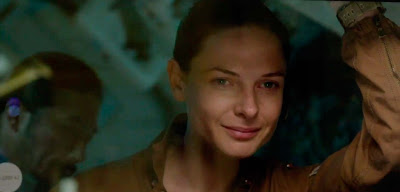Is there anyone else in the movie world making such intelligent, suprising and entertaining blockbusters as that South Korean filmmaker Bong Joon-ho? I don't think so. He is indeed the new Spielberg but also something quite "more." After his Snowpiercer (from 2014), he has now gifted us with OKJA, the new sci-fi/fantasy/(sort-of)monster movie that features as its leading character a stalwart adolescent girl up against a corporate world that controls us all these days. Really: I can't think of another moviemaker (Mr. Bong is shown below) who could begin a film as though it were a child-and-her-adorable-giant-animal movie and then, by its end, give us one of the most memorable, moving, surprising and disturbing scenes to ever grace the screen (and I mean any kind of screen, not simply the "theatrical" variety).
That scene, by the way, may make the movie a more difficult experience for kids -- even though they'll love and appreciate most of the film.
And yet, because Bong is such a smart and gifted filmmaker (Mother, Memories of Murder, The Host), he is able to simultaneously give us the "happy ending" that those kids (and, come on, us adults, too) so want, while forcing his audience to view the larger picture -- in a manner so stunning and wrenching that it will seem like nothing you've encountered previously.
For thie alone, Okja deserves, and will undoubtedly receive, its placement on many of the year's "best" lists. (In fact, Variety has already picked it as one of the top movies of the year at our current halfway point.)
The film's story -- no spoilers here -- is all about a girl and her pet pig. That the pig is one of many genetically modified porkers and has grown to "monster" size has been no problem, since the girl, her grandfather and their pig live way the hell out in the countryside where they see (and are seen by) nobody else.
In the supporting cast are the likes of Paul Dano (above) and Jake Gyllenhaal (below), but the movie belongs to the Korean actress Ahn Seo-hyun, as the girl, Mija, and to the special effects department that created Okja and her giant breed. She and they are wonders indeed.
The drama arrives when the corporate entity (personified by the gifted and funny Tilda Swinton) that owns the pig takes it away from the girl to become the mascot for a new line of "pork products." Will our heroine allow this to happen? Not on your strip of breakfast bacon. So our filmmaker orchestrates everything from top-notch chase scenes to a pig-in-the-china-shop spree in a Seoul mall, from a marketing parade in Manhattan to a scary scene in one of those experimental laboratories.
But Bong is simply smarter than almost all the other would-be-blockbuster moviemakers. He always sees both sides of the situation, and so continuallly surprises and unsettles us. He understands that the power of money and greed can work both ways, that corporations can make themselves rich while feeding the planet, and that animal activists who want to harm neither animals nor humans will occasionally do both. He also understands the impulse not to kill other life forms we come to care for, and this, finally, is what sets up the film's biggest conflict.
So, sure, children will find more on their plate than movies like this usually provide. But give them the chance to view and handle it, and I suspect they'll remember this film for a long, long time. Stick with it, and you will, too. Opening a only a few theaters (in New York City at the Film Society of Lincoln Center and in the Los Angeles area at Laemmle's Monica Film Center), the film will find its biggest international audience via Netflix streaming, where it is now playing.



























































